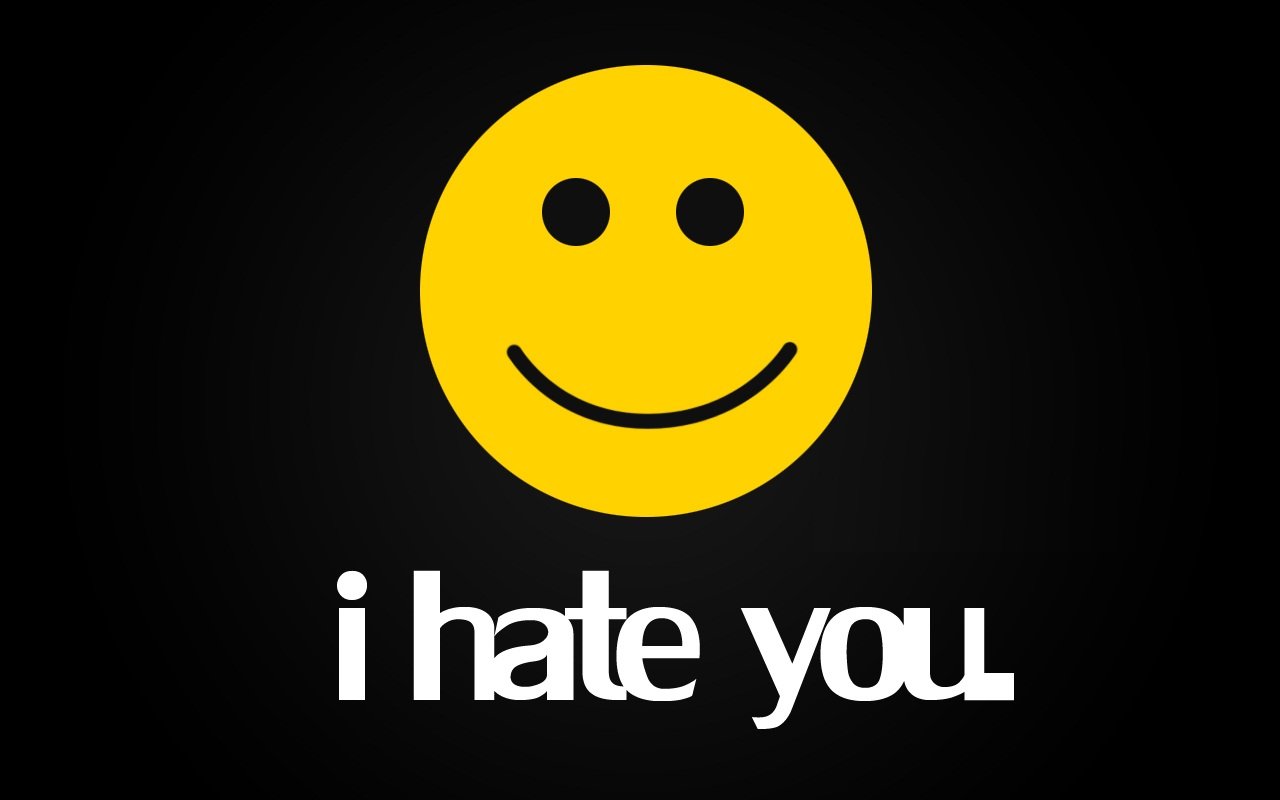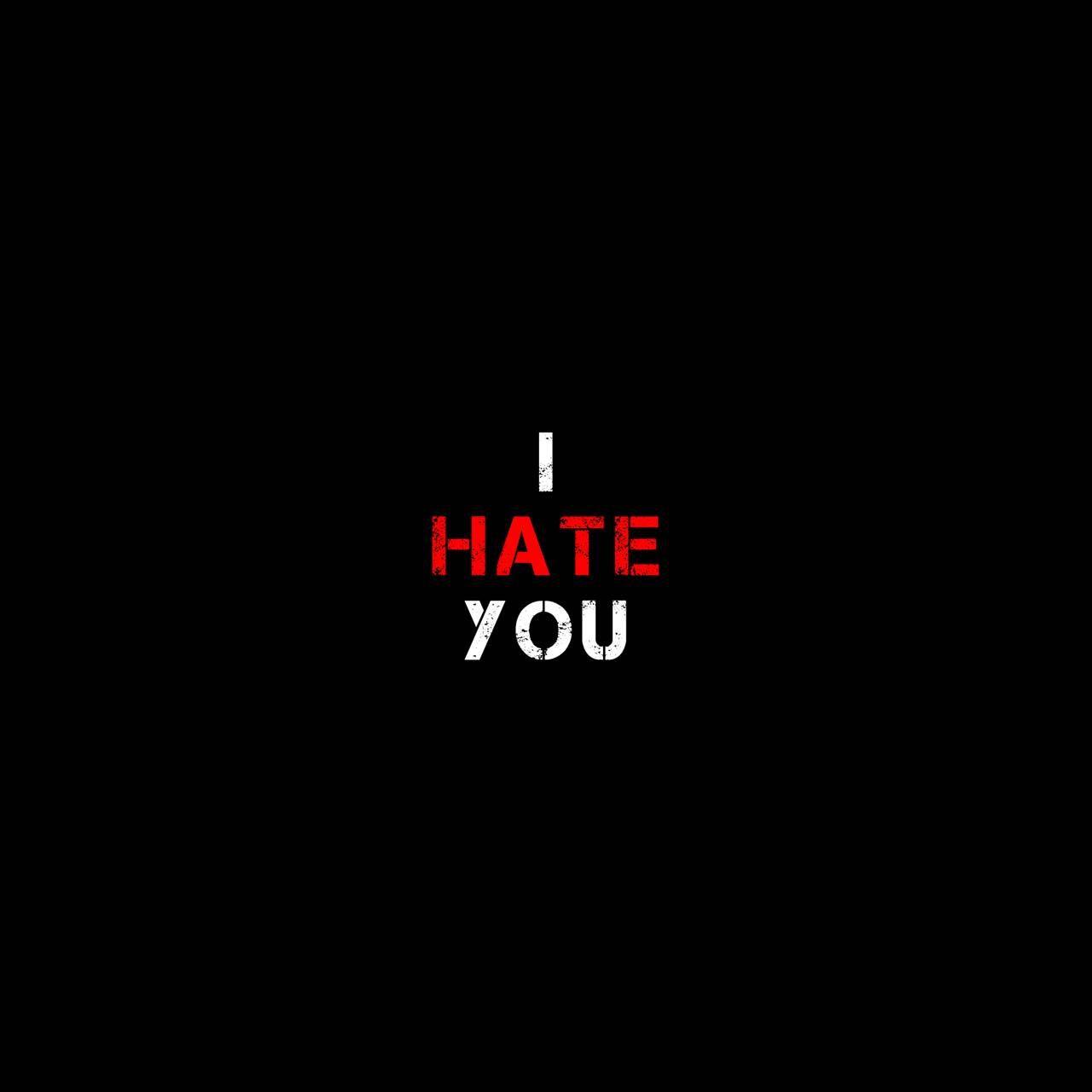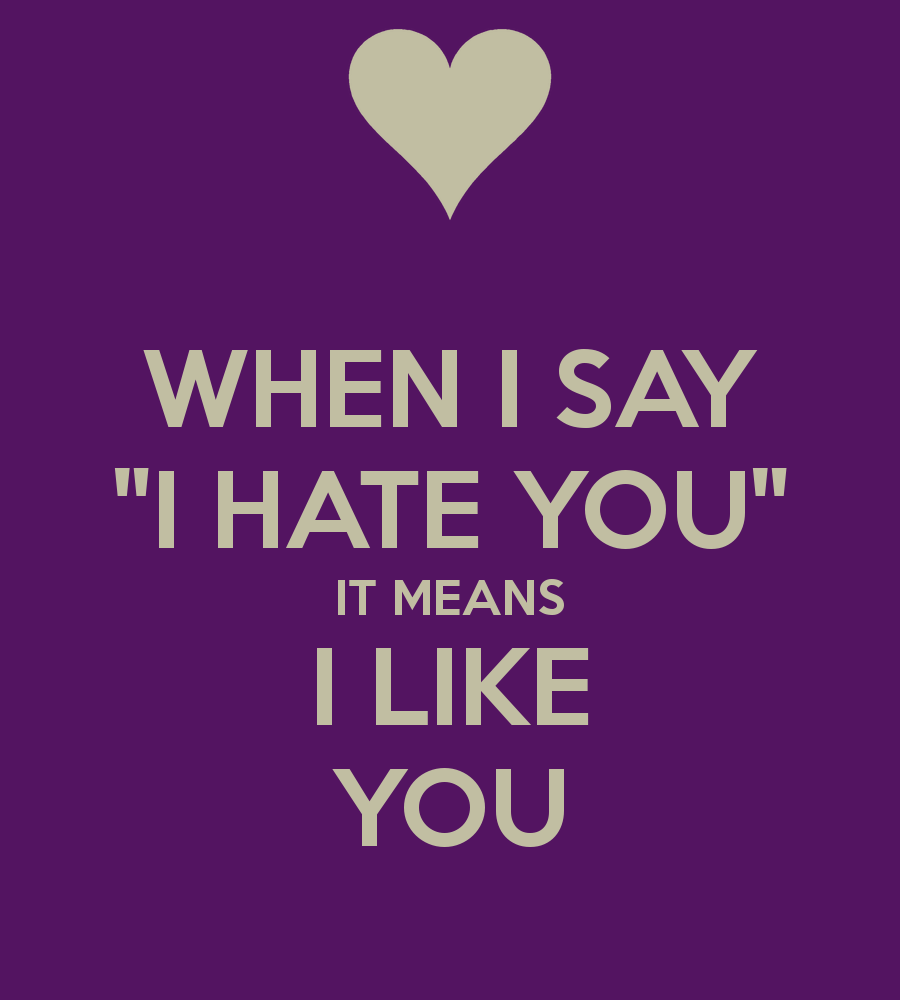The Complex Echo Of 'I Hate You': Decoding A Powerful Phrase
The phrase "I hate you" carries an undeniable weight, a raw intensity that few other combinations of words can match. It’s a declaration, an expulsion of feeling that can range from a fleeting frustration to a deep, consuming animosity. Yet, despite its seemingly straightforward meaning, the contexts in which we encounter and utter "I hate you" are incredibly varied, reflecting a fascinating spectrum of human emotion, experience, and even entertainment. This article delves into the multifaceted nature of this potent expression, exploring its presence in our media, our personal frustrations, and the profound psychological landscapes it often represents.
From the gripping narratives we consume on screen to the minor tech glitches that push us to our limits, the sentiment behind "I hate you" is a universal thread, weaving through the fabric of our daily lives. It's a phrase that can be screamed in anger, whispered in despair, or even uttered with a wry smile, hinting at a complex "love to hate" dynamic. Understanding these nuances helps us not only decode the phrase itself but also gain deeper insights into the human condition and the powerful emotions that drive us.
Table of Contents
- Understanding the Weight of "I Hate You"
- "Love to Hate You": When Contempt Becomes Compelling
- The Digital Realm: "I Hate You" in Games and Online Frustrations
- The Genesis of Aversion: Why We "Hate"
- The Consuming Nature of "I Hate You": A Cautionary Tale
- Navigating Negative Emotions: Beyond the "I Hate You"
- The Performance of Feelings: Masking What We Truly "Hate"
- Embracing Nuance: The Path to Understanding
Understanding the Weight of "I Hate You"
The simple three-word phrase, "I hate you," is anything but simple in its implications. It's a phrase often reserved for moments of intense emotional distress, profound betrayal, or overwhelming frustration. Unlike milder expressions of dislike or annoyance, "I hate you" suggests a deep-seated aversion, a rejection of a person, an idea, or a situation. Its power lies in its finality, its declaration of a seemingly insurmountable emotional chasm. When someone utters "I hate you," whether directed at another person, a challenging circumstance, or even an inanimate object, it often signals a moment where emotions have reached a boiling point. It’s a release valve for pent-up feelings, a desperate cry for something to change, or an expression of profound hurt. The impact of hearing or saying "I hate you" can be long-lasting, shaping relationships and perceptions. It forces a confrontation with powerful negative feelings that can be difficult to process, both for the speaker and the receiver.The Spectrum of Negative Emotion
It's crucial to recognize that "I hate you" doesn't always signify the same level of animosity. There's a wide spectrum. On one end, it can be a hyperbolic expression of mild annoyance, a dramatic flair for a minor inconvenience. For instance, you might exclaim, "I hate you!" to a friend who just played a harmless prank on you, or to your computer when it crashes unexpectedly. This usage is often fleeting, a momentary outburst that quickly dissipates. On the other end of the spectrum, "I hate you" can be a deeply felt, agonizing declaration born from profound hurt, betrayal, or injustice. This is the "I hate you" that emerges from the wreckage of a broken relationship, a significant loss, or a deep-seated trauma. It's the kind of hate that can consume a person, affecting their thoughts, actions, and overall well-being. Understanding this spectrum is vital, as it informs how we interpret and respond to the phrase in various contexts, whether in real life or within the narratives we consume."Love to Hate You": When Contempt Becomes Compelling
One of the most intriguing ways the phrase "I hate you" manifests in popular culture is through the "love to hate you" trope. This isn't about genuine, destructive hatred, but rather a complex, often playful dynamic where initial antagonism evolves into attraction or grudging respect. It's a narrative device that thrives on witty banter, clashing personalities, and the slow burn of undeniable chemistry emerging from initial disdain. The sentiment "I absolutely loved 'Love to Hate You'" perfectly encapsulates this phenomenon. Viewers are drawn to the friction, the push and pull between characters who initially seem diametrically opposed. It's satisfying to watch protagonists who defy conventional romantic leads, especially a female lead who isn't a "shrinking violet for a FL who blushes and drops her head if the ML tries to kiss her." Instead, she's strong, independent, and perhaps even a bit cynical in her "treatment of men and how she notices peoples words and reacts to others." This subversion of traditional gender roles adds depth and realism, making the eventual softening of hearts all the more impactful. The initial "I hate you" becomes a foundation for a more profound connection, built on mutual challenge and respect rather than immediate adoration.Narratives That Challenge Expectations
The appeal of "love to hate you" narratives lies in their ability to challenge audience expectations. We're accustomed to clear-cut heroes and villains, but these stories thrive in the grey areas. They often feature characters who are flawed, complex, and initially unlikable, forcing the audience to look beyond superficial judgments. This is where the initial "I hate you" from a character or even the audience can transform into a reluctant admiration. Consider the dynamic where a male lead "had become a misogynist because his gf betrayed him." This backstory, while not excusing his behavior, provides a window into the origins of his flawed character. The audience might initially "drop it if you don't like to see a misogynist man on screen," and perhaps even feel a strong "I hate you" towards him. However, if the narrative skillfully explores his journey, showing how "I initially thought it would get better and he'd redeem himself," it can lead to a more nuanced understanding. The "love to hate you" dynamic isn't just about romance; it's about the compelling journey of character development, where initial aversion gives way to empathy, or at least a fascination with their complexity. It allows for the exploration of redemption, forgiveness, and the idea that people can change, even if they start from a place of deep-seated negativity.The Digital Realm: "I Hate You" in Games and Online Frustrations
Beyond interpersonal relationships and fictional narratives, the phrase "I hate you" also finds a significant home in the digital realm, particularly within gaming and our daily interactions with technology. Here, the sentiment often takes on a different flavor – one of intense frustration, nostalgic exasperation, or even a deliberate embrace of unsettling themes. The gaming world, in particular, is rife with instances where players might exclaim "I hate you!" out of pure challenge or playful defeat. But then there are games where the phrase is embedded into the very fabric of the experience, designed to evoke a sense of unease or dread. "The creepypasta was called either i hate you or mario, i hate you. it's been made into an actual game too." This points to a genre of horror where the "I hate you" isn't just a player's reaction but a core thematic element, creating a disturbing atmosphere that lingers long after the game is over. It taps into a primal fear of being targeted, unwanted, or subjected to malevolent forces.From Creepypasta to Everyday Annoyances
The digital landscape also provides ample opportunities for everyday "I hate you" moments born from technological frustrations. We've all been there: "Im left with google not even opening its so bad, I hate it so much, Please i need help i just want to be able to search things up without being safesearched." This isn't a deep, personal hatred, but a visceral reaction to feeling powerless in the face of malfunctioning technology. It's the "I hate you" directed at a slow internet connection, a frozen screen, or software that refuses to cooperate. These moments, while seemingly trivial, can significantly impact our daily productivity and mental state, highlighting how even minor annoyances can trigger strong emotional responses. Then there's the nostalgia factor. "When i booted it up, it immediately reminded me of the times that i spent configuring mupen64 and playing." This speaks to the complex relationship we have with older technology and games. While there's affection, there's also the memory of past frustrations – the hours spent troubleshooting, the glitches, the difficult controls. The "I hate you" here might be a fond memory of past struggles, a testament to how far technology has come, or a playful jab at the quirks of vintage gaming. It underscores that even in our recreational pursuits, the phrase "I hate you" can be a part of the experience, shaping our memories and interactions.The Genesis of Aversion: Why We "Hate"
Understanding the origins of "hate" is crucial for navigating its complexities. Rarely does deep-seated animosity arise in a vacuum; it almost always stems from a perceived wrong, a profound hurt, or a sense of betrayal. The phrase "I hate you" often becomes the vocal manifestation of these underlying wounds. Consider the example of a character who "had become a misogynist because his gf betrayed him." While this explanation doesn't justify the misogyny, it provides a psychological root for the behavior. His "hate" for women, or at least his distrust and disdain, is a distorted coping mechanism for his own pain. This illustrates a common pattern: hate can be a twisted form of self-protection, a shield erected after a traumatic experience. It's easier, sometimes, to project anger outwards than to confront the vulnerability of inner pain. Furthermore, "hate" can be cultivated through prolonged exposure to negative experiences or ideologies. It can be learned, reinforced by echo chambers, or fueled by a sense of injustice. Whether it's a personal betrayal, systemic oppression, or the relentless negativity of certain online communities, the seeds of "I hate you" are often sown in environments that foster fear, anger, and a lack of empathy. Recognizing these origins is the first step towards understanding, and potentially mitigating, the destructive power of true hatred.The Consuming Nature of "I Hate You": A Cautionary Tale
While "I hate you" can be a fleeting expression of frustration, it can also represent a profound, all-consuming state of being. When hate takes root, it has the potential to distort perceptions, fuel destructive actions, and ultimately, destroy the individual harboring it. This is the cautionary tale embedded within many powerful narratives, illustrating the perils of letting negativity consume one's soul. The tragic fall of Anakin Skywalker serves as a potent example: "To me, it was a really big moment for anakin's fall, After dueling his master, getting dismembered by him, and laying next to a river of lava, he is still so consumed by the dark side." Despite immense physical and emotional suffering, his "I hate you" for Obi-Wan, for the Jedi, and for his perceived betrayers, overrides any instinct for self-preservation or reflection. His hatred becomes his identity, blinding him to reason and compassion. This narrative powerfully illustrates how the dark side, fueled by intense negative emotions, can lead to self-destruction, even when presented with an opportunity for repentance or escape. This consuming nature of "I hate you" extends beyond fictional characters. In real life, unresolved anger and hatred can lead to chronic stress, physical ailments, and strained relationships. It can prevent individuals from moving forward, trapping them in a cycle of resentment and bitterness. The energy expended on maintaining such a powerful negative emotion can drain vitality, leaving little room for joy, growth, or connection. Recognizing this destructive potential is vital for personal well-being, underscoring the importance of addressing and processing strong negative feelings before they become all-encompassing.Navigating Negative Emotions: Beyond the "I Hate You"
Given the powerful and often destructive nature of the sentiment "I hate you," it becomes imperative to explore healthy ways of navigating negative emotions. While it's natural and even necessary to feel anger, frustration, or sadness, allowing these feelings to fester into consuming hatred can be detrimental. The goal isn't to suppress these emotions, but to understand them and process them constructively. One approach is to identify the root cause of the feeling. Is the "I hate you" truly directed at a person, or is it a projection of deeper pain, fear, or helplessness? For instance, the frustration of "google not even opening" might lead to an outburst of "I hate it so much," but the underlying emotion is likely helplessness or a disruption to one's workflow, rather than genuine animosity towards a search engine. Recognizing these nuances allows for a more targeted response, perhaps seeking technical support rather than dwelling on the anger. Furthermore, developing emotional intelligence involves understanding "her treatment of men and how she notices peoples words and reacts to others." This implies a conscious awareness of how one's own emotions influence interactions and how others' words can trigger reactions. Instead of immediately reacting with "I hate you," one can pause, reflect on the trigger, and choose a more measured response. This might involve setting boundaries, communicating feelings assertively, or seeking support from trusted individuals. The journey beyond the raw declaration of "I hate you" involves self-awareness, empathy, and a commitment to emotional well-being.The Performance of Feelings: Masking What We Truly "Hate"
Sometimes, the phrase "I hate you" isn't spoken aloud, or the true sentiment is carefully concealed beneath a facade. In social and professional settings, there's often an unspoken pressure to present a certain image, even when internal feelings contradict it. This leads to the "performance of feelings," where we mask what we truly "hate" or dislike for the sake of decorum, opportunity, or social acceptance. Consider the scenario: "During this, you have to act enthusiastic and interested and make eye contact (with the camera)." This describes a situation where genuine enthusiasm might be absent, yet it's required for a successful outcome, perhaps in a job interview, a presentation, or a public appearance. The underlying feeling might be anxiety, boredom, or even a subtle "I hate you" directed at the situation itself, but the outward performance must be positive. This highlights the emotional labor involved in modern life, where we often suppress authentic feelings for strategic reasons. This masking can be a double-edged sword. While necessary for social harmony and professional success, consistently suppressing genuine emotions can lead to emotional exhaustion and a sense of inauthenticity. The unexpressed "I hate you" can fester, contributing to stress and resentment. It's a delicate balance between maintaining appropriate conduct and acknowledging one's true emotional landscape. Understanding this dynamic helps us recognize the hidden emotional battles people might be fighting, even when they present a cheerful or composed exterior.Embracing Nuance: The Path to Understanding
Ultimately, the phrase "I hate you" is a powerful linguistic tool that encapsulates a vast range of human experience. From the dramatic arcs of "love to hate you" narratives to the frustrating moments of technological failure, and from the deep psychological roots of aversion to the performative aspects of social interaction, its meaning is rarely singular. Embracing this nuance is key to a deeper understanding of ourselves and others. It encourages us to look beyond the surface, to question the origins of strong emotions, and to recognize the complex interplay of factors that lead to such declarations. Whether it's the consuming hatred of an Anakin Skywalker or the fleeting annoyance at a malfunctioning Google search, each instance of "I hate you" offers a glimpse into the human psyche. It prompts us to consider: What is truly being expressed? What pain or frustration lies beneath? And how can we, as individuals and as a society, better navigate these intense emotional landscapes? By dissecting the various contexts and implications of "I hate you," we move towards a more empathetic and insightful understanding of human behavior. It's a reminder that even the most seemingly negative expressions can be rich with meaning, offering pathways to self-discovery and improved relationships.Conclusion
The phrase "I hate you" is far more than a simple declaration of animosity. As we've explored, it's a multifaceted expression, ranging from a playful dynamic in compelling narratives like "Love to Hate You" to the profound, consuming darkness seen in characters like Anakin Skywalker. It encapsulates our everyday frustrations with technology, the deep-seated origins of personal aversion, and even the careful performance of emotions in social settings. Each instance, whether spoken aloud or felt internally, offers a unique window into the human experience. Understanding the various layers of "I hate you" allows us to approach powerful emotions with greater insight and empathy. It encourages us to look beyond the surface, to consider the pain, frustration, or even the hidden affection that might lie beneath. By recognizing the spectrum of this powerful phrase, we can better navigate our own feelings and respond more thoughtfully to the emotions of others. What are your thoughts on the phrase "I hate you"? Have you encountered it in a way that surprised you, or perhaps in a context that made you reconsider its meaning? Share your experiences and perspectives in the comments below – your insights contribute to a richer understanding of this compelling human expression. If you found this exploration valuable, consider sharing it with others, or delve deeper into our other articles on emotional intelligence and media analysis.
25 I Hate You Pictures to Express Your Feelings

I Hate You Wallpapers - Top Free I Hate You Backgrounds - WallpaperAccess

Images Hate You Quotes